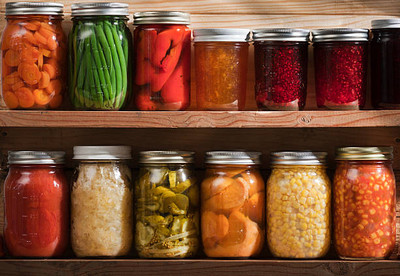Why it's time to stock up on preserving jars
Posted by The Wares Team on 17th Aug 2022
With the UK climate undoubtedly changing, crops are now coming in earlier than they once would have done. Even in August, fruit is ripening on the trees; far earlier than it would have done in the past. From orchards to blackberry bushes, it's vital to preserve precious fruit stores before they rot and become wasted. It's even more important when you're planning to use the fruit you've grown yourself, and have spent time nurturing over summer in preparation for the big pick!
Which fruits are ripening in August?
Across the UK, you'll currently find apples, pears, plums, autumn-fruiting raspberries, blueberries and other berry fruit, nectarines and peaches, figs and wild fruits such as blackberries, wild raspberries and more.
- From August, you will find early-season apples, blackcurrants, blackberries, plums, cherries, tayberries, strawberries and raspberries
- From September, you can harvest blackberries, mid-season apples, plums, elderberries, strawberries and raspberries
- From October you'll still be able to harvest apples, pears, elderberries, raspberries, plums and strawberries
After spells of particularly hot weather, later-season fruits such as blackberries can ripen well before the end of August (as they have this year) and strawberries can keep being productive well into autumn.
How to preserve fruits
Fruit preserving techniques have been around for centuries. For example, people have long been making jam, conserves and chutneys, bottled fruits, and dried fruits. Compotes can be stored in the freezer and when you buy the right preserving jars, many of your creations will last for months if they are kept away from heat and direct light. Here are some tips for success:
1. Only use the best fruits and vegetables for your preserves and remove any which are damaged, bruised or soft. If the fruit you intend to use for jam is too squidgy, for example, it's harder to get a set and more likely to ferment.
2. Invest in the best equipment, for the best results. Specialist preserving jar ranges, jam thermometers and quality sieves all make a difference to the finished result.
3. Weigh everything carefully - with jam in particular it's important to use the correct amounts and proportions to achieve a good set.
4. Always use cane sugar, which results in a beautiful shine and a reliable set.
5. Make jam immediately after picking your allotment or garden fruit as the pectin levels will be highest for the best results.
6. Always buy new lids. An old lid on an old preserving jar may seem like the ultimate environmentally-friendly move, but it's actually more likely to risk a spoiled jam. This is because old lids can contain mould spores that grow and spoil the contents of your preserving jars.
7. For a failsafe jam set, use a jam thermometer. The flake method is great, but most recipes require you to achieve a temperature of 104.5 C and this is a reliable way of getting results.
8. Don't double up! It's tempting to double up ingredients to make more jams, but you'll end up needing to simmer the fruit for longer which will impair the colour and flavour. Find a recipe that works for you, stick to the ingredients and experiment as you become more experienced.
Ways to use preserved fruits
You can use fruit to make chutneys and sauces and to bake with. Here are some ideas and simple recipes you might like to try:
Crab apple jelly
Crab apples are a lot of fun to pick and you'll find them everywhere as we move into autumn, from country hedgerows to ornamental crab apples in parks and gardens. They make a wonderful pink jelly thanks to their high pectin content. Gather 5 preserving jars which have been sterilised and rinse 2lb of crab apples before chopping them roughly. Place them into a large saucepan with 4 cloves and 2 pints of water and simmer them, with a lid on, for 45 minutes or until soft. It's worth cooking them slowly for the best flavour and colour.
Strain the mix so that the juice comes through but the fibre remains. Leave it overnight if possible. Measure 1 3/4 litres of crab apple stock and 600g of sugar per litre. Simmer the stock and add a little sugar at a time until it dissolves. Rapid boil until the setting point is achieved and remove from the heat, letting the mix rest for a few minutes and then pouring into a jar with a lip to help you fill your jars.
Simple sauce
Remember too that you can simply chop and gently simmer your late summer fruits with a little sugar, sweetener and cinnamon to make a delicious fruit compote that can be used to flavour morning granola and thick Greek yoghurt, or as a base for crumble. Why not layer Mason jars with your compote and thick whipped cream for a delicious dessert that is ideal for the end of a hot, summer's day. Remember too to stock up on your preserving jars now - and have some fun in the kitchen!

